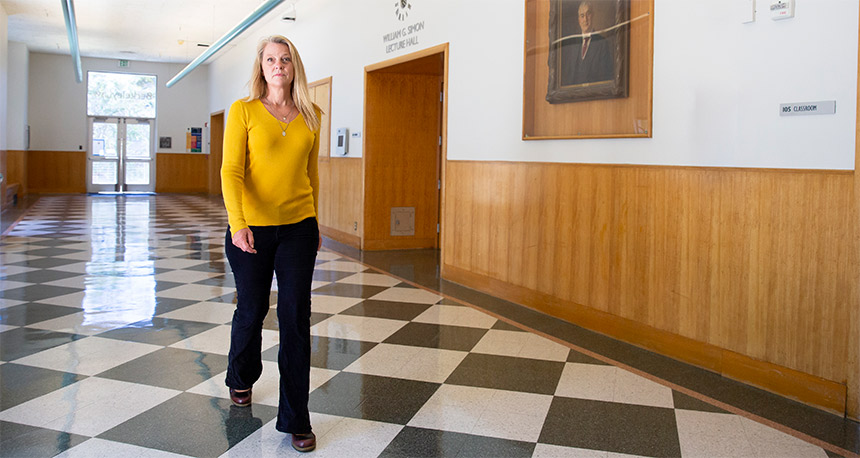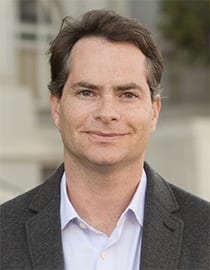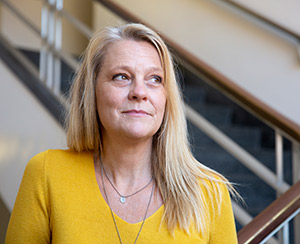
By Andrew Cohen
Promoting a Berkeley Law faculty member to Security of Employment status requires “clear documentation of consistent and sustained excellence in teaching.” For Kristen Holmquist, such paperwork could fill a few lecture halls.
Since arriving in 2008, she has helped Berkeley Law students in myriad ways across multiple platforms — building a robust academic support program, expanding practical hands-on legal training opportunities, advancing diversity and inclusion, fueling curricular flexibility, and more.
In 2014, Holmquist was a faculty speaker at graduation. In 2017, she became the school’s director of experiential education and won its prestigious Rutter Award for Teaching Distinction. And this month, she was promoted to Lecturer with Security of Employment.

“It is impossible to overstate Kristen’s contributions to the law school, and in particular to our experiential education program,” says Clinical Professor of Law and Death Penalty Clinic Co-Director Ty Alper, who led the program before Holmquist. “There is almost nothing that works well at the law school that doesn’t have Kristen’s fingerprints on it.”
Hired to create and direct a comprehensive academic skills program and to teach core doctrinal courses that implement her skills-focused teaching philosophy, Holmquist was Berkeley Law’s director for academic skills from 2008 to 2019. She had spent the previous six years as a lecturer and director of academic support at UCLA Law, earning a reputation as a leader in the field and winning service and mentoring awards from student groups.
At Berkeley Law, Holmquist strategically developed the program with programmatic and curricular elements that include pre-orientation, three separate courses, tutoring, workshops, and one-on-one support.
“Teaching is my most significant responsibility,” she says. “It’s what I’m best at and what I most love about my job. I started in legal education as an academic support teacher and administrator, and that foundation informs all aspects of my teaching.”
Multifaceted educator
Holmquist teaches two core doctrinal courses: Constitutional Law to spring semester 1Ls — routinely receiving more than 50 applications for the 35 places — and Estates and Trusts to upper-division students. Her course evaluations are widely glowing, nearly all coming in over the faculty mean.
When Holmquist won the Rutter Award, Jasleen Singh ’17 lauded her “incredible talent for guiding students through a concept.” Singh, who took two of Holmquist’s classes, said she “welcomes all discussion and viewpoints and empowers students to talk through their logic in a welcoming, non-judgmental way. She’s there for them both as a professor and mentor.”
Holmquist also teaches Lawyering as Problem Solving, Satisfaction in Law and Life, and this year added a one-unit 1L elective course called How to Be Happy in Law School.

“My happiness classes recognize that law students and lawyers, like the clients they are working with and the judges they are trying to persuade, are humans,” she says. “And that they deserve to find satisfaction in their career as a lawyer.”
Each week in class, Holmquist explores a different element of career satisfaction: autonomy, authenticity, relationships, physical and financial security, competence, and self-esteem. Guest lawyers, many Berkeley Law alumni, share their career paths and insights on how decisions they’ve made have impacted their well-being.
In all her courses, she strives to make clear connections between classroom conversations and actual lawyering.
“Students feel empowered when they learn that the arguments they’re making on exams are not so very different from arguments they’ll make as professionals,” Holmquist says.
Serving all students
Recognizing that a traditional teaching approach doesn’t work well for a subset of law students, she connects the relationship between pragmatic education, academic support, and inclusive pedagogy.
“These students often describe themselves as mystified by what professors are looking for in their written answers and oral exchanges,” Holmquist says. “An effective teacher demystifies the process by making explicit the intellectual, psychological, and cultural patterns at play in ‘thinking like a lawyer.’ Students who initially struggle get better at exam-taking when they understand these patterns and processes.”
As director of experiential education, she supervises leaders of pro bono, academic skills, advocacy competition, and field placement programs, and fills out non-clinical experiential offerings with part-time lecturers.
Holmquist has also served on several committees that helped create more diversity and inclusion at the law school and gave 1Ls more room to take electives in their spring semester.
Having published articles on creating inclusive and equitable classrooms, lawyering competencies and racial equity in law school admissions, and curriculum reform, Holmquist has long infused experiential techniques in her doctrinal courses — and now sees more colleagues doing the same. Her arrival at Berkeley coincided with the economic downturn of 2008, leading to legal employers increasingly demanding that new lawyers be able to hit the ground running.
“These concepts are all related,” she says. “An inclusive, equitable, hands-on education prepares new lawyers to get out there and serve their clients.”